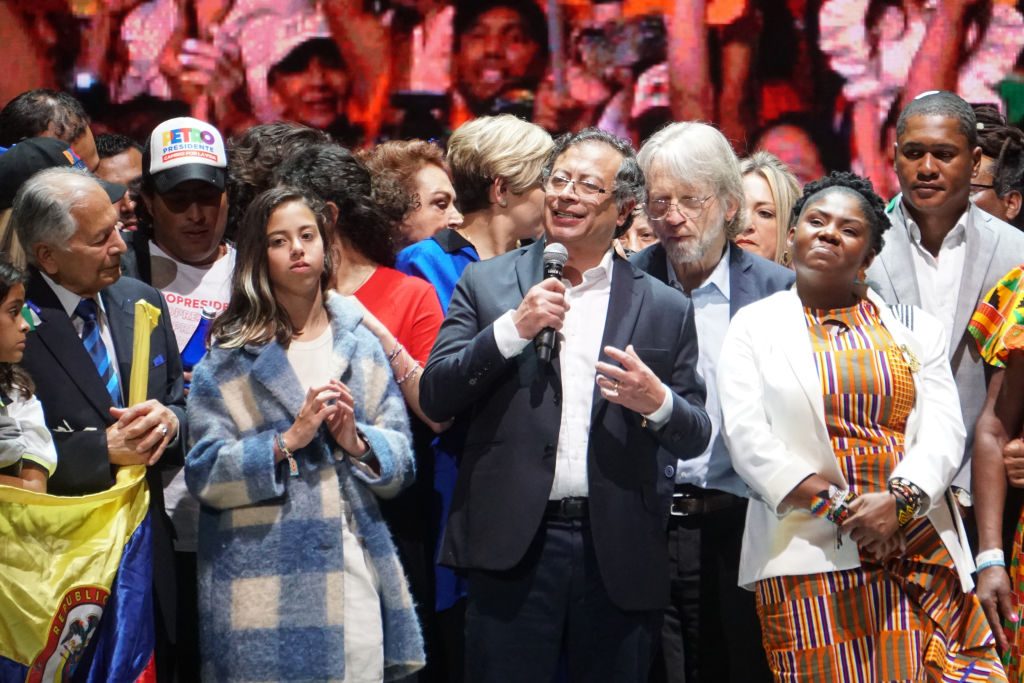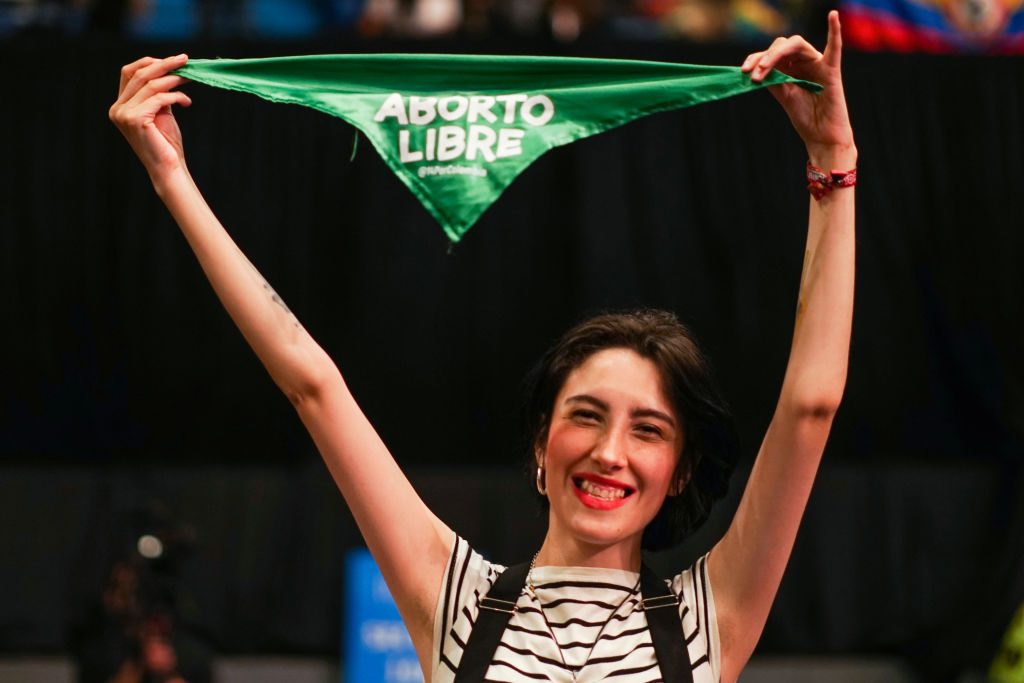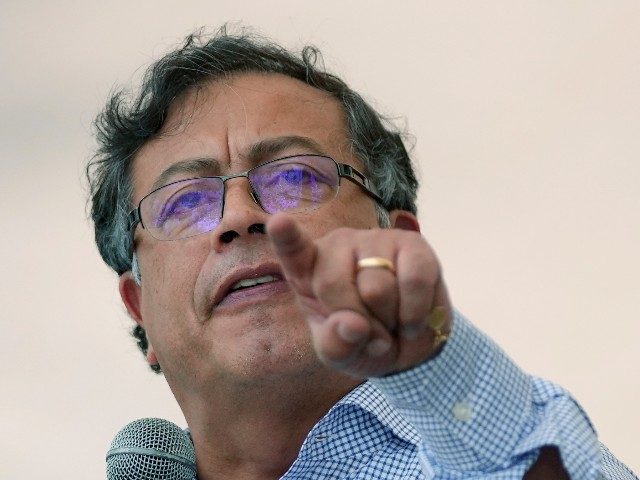Colombian President-Elect Gustavo Petro, a former member of a Marxist terrorist organization, announced on Wednesday that he engaged in a friendly conversation with Venezuelan dictator Nicolás Maduro aimed at “normalizing” relations.
Colombia, previously one of the most conservative countries in the region, elected Petro last week in an election riddled with irregularities that Petro himself had denounced as rigged prior to winning it.
Neither Petro nor challenger Rodolfo Hernández, an outsider businessman with no clear political ideology, have challenged the results of the election, and observers like the administration of President Joe Biden celebrated the vote as “free and fair.”
If inaugurated, Petro will become the country’s first-ever far-left president. Petro has promised to greatly expand the country’s social safety net and enhance relations with regimes like Maduro’s, in addition to ending the drug war – which is also a war against Marxist terrorists like the M19 group that Petro once belonged to – and crushing the nation’s self-sufficient oil and gas industries.
Colombia currently recognizes Venezuela’s legal president, Juan Guaidó, as the president of the country, not the rogue Maduro dictatorship. Petro’s call to Maduro appears to signal that his administration will not maintain ties with Guaidó, disregarding the legitimacy of Venezuela’s constitution.

Gustavo Petro gives a speech after the election victory on Sunday in Bogota, Colombia, June 19, 2022. (Daniel Garzon Herazo/NurPhoto via Getty)
While Guaidó is legally the president of the country, he possesses no practical power as the Venezuelan armed forces and police continue to answer to Maduro and Maduro has illegally occupied the presidential palace, Miraflores, since 2019. Maduro was legally the president of Venezuela from 2013 to 2019.
Colombia had already significant cut relations with Maduro, however, long before Guaidó became president in response to a brutal campaign of violence against Colombian citizens on the Venezuelan side of the border in 2015 that included beatings and widespread reports of rape by police, the arbitrary seizure of homes, and destruction of property believed to belong to Colombians.
Then-President Juan Manuel Santos compared Maduro’s tactics to those of Nazi Germany but did not take any meaningful action to condemn Colombia.
Maduro later shut the border between Venezuela and Colombia in 2019 to block humanitarian aid for his starving people from entering the country.
Petro announced his conversations with Maduro in a post on Twitter in which he described Maduro’s regime incorrectly as “the Venezuelan government.”
“I have communicated with the Venezuelan government to open the borders and re-establish the full exercise of human rights on the border,” Petro wrote.
Me he comunicado con el gobierno venezolano para abrir las fronteras y restablecer el pleno ejercicio de los derechos humanos en la frontera.
— Gustavo Petro (@petrogustavo) June 22, 2022
Maduro offered more extensive comments on their discussion.
“I spoke to the president-elect of Colombia, Gustavo Petro, and in the name of the Venezuelan people I congratulated him on his victory,” Maduro wrote in a social media post, according to state propaganda network VTV. “We discussed the disposition of re-establishing normalcy on the border, various issues about peace and the prosperous future of both peoples.”
Conversé con el presidente electo de Colombia @petrogustavo, y en nombre del pueblo venezolano, lo felicité por su victoria. Dialogamos sobre la disposición de restablecer la normalidad en las fronteras, diversos temas sobre la Paz y el futuro próspero de ambos pueblos. pic.twitter.com/ZK3cBE8JdO
— Nicolás Maduro (@NicolasMaduro) June 22, 2022
Colombian voters did not have a meaningful choice on the issue of normalizing relations with Maduro in the second round of the presidential election. Rodolfo Hernández, who campaigned on a vague promise of eradicating corruption, said that he would, if elected, re-establish relations with Maduro to make it easier for Colombians to travel to Venezuela and vice versa.
Outgoing President Iván Duque responded to the news of Petro’s call to Maduro by noting that his government never cut ties with Venezuela – just the illegitimate Maduro regime – and stating wryly that the border does not appear to be closed given the evidence that Marxist terrorists regularly cross it to engage in drug trafficking and other violent activity.
“The borders haven’t been closed,” Duque said, according to the Colombian right-leaning magazine Semana. “‘Pablito’ is over there, ‘Antonio García’ is over there, ‘Iván Márquez’ is over there,” Duque said, referring to several high-profile narco-terrorist leaders believed to be operating in Venezuela under Maduro’s auspices. “So let them return them [to Colombia], let them extradite them so that they can show Colombia that there is a will to collaborate with our country.”
The Revolutionary Armed Forces of Colombia (FARC), the largest and deadliest narco-terrorist group in the country, celebrated Maduro’s victory in a rare press release published on their website on Tuesday featuring flattering photos of Petro and Vice President-elect Francia Márquez.
“We support the government of life and hope,” the message from the terrorists read in part, “that is now being born … willing to return peace and dignity to us, to defend the world from climate change with the shield of the Amazon rainforest, which should be expanded.”

A woman celebrates the victory of candidate Gustavo Petro of the Pacto Historico party, Colombia’s new president in Bogota, June 19, 2022. (Daniel Garzon Herazo/NurPhoto via Getty Images)
“We call on the public forces [police, military] to back and obey the president-elect since he is constitutionally their supreme commander. Join the human tide for life and peace,” the terrorists recommended.
Colombia, under President Juan Manuel Santos, signed an unconstitutional “peace deal” with the FARC in 2016 despite Colombians rejecting the move in a national referendum. The deal gave the FARC uncontested seats in Congress and a path to amnesty for violent crimes deemed “political.” In an attempt to make the deal appear successful, the Colombian government began referring to FARC deals caught engaging in narco-terrorism despite agreeing to no longer do so as FARC “dissidents” and using the term for their new insurrection, “Second Marquetalía,” as the name of an alleged separate terrorist group.
The Biden administration followed suit and delisted the FARC as a terrorist organization in November.
Most active FARC (“Second Marquetalía”) leaders are believed to be in Venezuela with no significant movement by Maduro to arrest them or otherwise prevent them from engaging in terrorist activity or drug trafficking. The FARC long enjoyed relations with Maduro’s predecessor Hugo Chávez, even throwing a 50th birthday celebration in Venezuela in 2014.

COMMENTS
Please let us know if you're having issues with commenting.